Related Research Articles
Queer theory is a field of post-structuralist critical theory that emerged in the early 1990s out of queer studies and women's studies.
The disability rights movement is a global social movement that seeks to secure equal opportunities and equal rights for all people with disabilities.
Disability studies is an academic discipline that examines the meaning, nature, and consequences of disability. Initially, the field focused on the division between "impairment" and "disability", where impairment was an impairment of an individual's mind or body, while disability was considered a social construct. This premise gave rise to two distinct models of disability: the social and medical models of disability. In 1999 the social model was universally accepted as the model preferred by the field.

Judith Ellen "Judy" Heumann was an American disability rights activist, known as the "Mother of the Disability Rights Movement". She was recognized internationally as a leader in the disability community. Heumann was a lifelong civil rights advocate for people with disabilities. Her work with governments and non-governmental organizations (NGOs), nonprofits, and various other disability interest groups significantly contributed to the development of human rights legislation and policies benefiting children and adults with disabilities. Through her work in the World Bank and the State Department, Heumann led the mainstreaming of disability rights into international development. Her contributions extended the international reach of the independent living movement.
Charlotte Cooper is a London-based British writer and outspoken advocate for gay rights and fat acceptance.
Section 504 of the Rehabilitation Act of 1973 is American legislation that guarantees certain rights to people with disabilities. It was one of the first U.S. federal civil rights laws offering protection for people with disabilities. It set precedents for subsequent legislation for people with disabilities, including the Americans with Disabilities Act in 1990.

Sexuality and disability is a topic regarding the sexual behavior and practices of people with disabilities. Like the general population, these individuals exhibit a wide range of sexual desires and adopt diverse methods of expressing their sexuality. It is a widespread concern, however, that many people with disabilities do not receive comprehensive sex education, which could otherwise positively contribute to their sexual lives. This stems from the idea that people with disabilities are asexual in nature and are not sexually active. Although some people with disabilities identify as asexual, generalizing this label to all such individuals is a misconception. Many people with disabilities lack rights and privileges that would enable them to have intimacy and relationships. When it comes to sexuality and disability there is a sexual discourse that surrounds it. The intersection of sexuality and disability is often associated with victimization, abuse, and purity, although having a disability does not change someone's sexuality, nor does it change their desire to express it.
Harilyn Rousso is an American disabled rights activist, psychotherapist, artist, and feminist. In 2003 she was designated a Women's History Month Honoree by the National Women's History Project.
Amber L. Hollibaugh was an American writer, filmmaker, activist and organizer concerned with working class, lesbian and feminist politics, especially around sexuality. She was a former Executive Director of Queers for Economic Justice and was Senior Activist Fellow Emerita at the Barnard Center for Research on Women. Hollibaugh proudly identified as a "lesbian sex radical, ex-hooker, incest survivor, gypsy child, poor-white-trash, high femme dyke."
Persimmon Blackbridge is a Canadian writer and artist whose work focuses on feminist, lesbian, disability and mental health issues. She identifies herself as a lesbian, a person with a disability and a feminist. Her work explores these intersections through her sculptures, writing, curation and performance. Her novels follow characters that are very similar to Blackbridge's own life experiences, allowing her to write honestly about her perspective. Blackbridge's struggle with her mental health has become a large part of her practice, and she uses her experience with mental health institutions to address her perspective on them. Blackbridge is involved in the film, SHAMELESS: The Art of Disability exploring the complexity of living with a disability. Her contributions to projects like this help destigmatize the attitudes towards people with disabilities. Blackbridge has won many awards for her work exploring her identity and the complexities that come with it.
The National Disabled Women's Educational Equity Project was established by Corbett O'Toole in Berkeley, California, in 1980. It was a three-year research and demonstration project. Based at the Disability Rights Education and Defense Fund (DREDF), the Project administered the first national survey on disability and gender. It also conducted the first national Conference on Disabled Women's Educational Equity, which was held in Bethesda, Maryland. It developed written materials for educators and counselors relevant to the needs of disabled women and girls. It also developed a book about role models for disabled teenage girls called No More Stares.
Kitty Cone was an American disability rights activist. She had muscular dystrophy. She moved to the California Bay Area in 1972, and began working as a community organizer for the disability rights movement in 1974.
Deborah Kaplan is an American disability rights activist and attorney. She is a quadriplegic. In 1974 she co-founded the Disabled Women's Coalition at the University of California, Berkeley, with Susan E. Sygall and in the same year she co-founded the Disability Rights Center with Ralph Nader. From 1980 until 1985 she was an attorney for the Disability Rights Education and Defense Fund (DREDF). In 1997, she became the executive director of the World Institute on Disability.

Wei Tingting is a Chinese LGBTI+ and feminist activist, writer and documentary filmmaker. She is one of the Feminist Five.
The 504 Sit-in was a disability rights protest that began on April 5, 1977. People with disabilities and the disability community occupied federal buildings in the United States in order to push the issuance of long-delayed regulations regarding Section 504 of the Rehabilitation Act of 1973. Prior to the 1990 enactment of the Americans with Disabilities Act, the Rehabilitation Act was the most important disability rights legislation in the United States.

Dragonsani "Drago" Renteria is a Chicano social justice, LGBTQ+ rights activist, community leader, educator, editor, historian, and artist.
Lesbian erasure is a form of lesbophobia that involves the tendency to ignore, remove, falsify, or reexplain evidence of lesbian women or relationships in history, academia, the news media, and other primary sources. Lesbian erasure also refers to instances wherein lesbian issues, activism, and identity is deemphasized or ignored within feminist groups or the LGBT community.
Eli Clare is an American writer, activist, educator, and speaker. His work focuses on queer, transgender, and disability issues. Clare was one of the first scholars to popularize the bodymind concept.

Dykes, Disability & Stuff was a lesbian and disability magazine founded in 1988 in Boston, Massachusetts and published in Madison, Wisconsin. Its publication ended in Fall 2001.
References
- ↑ "Advocate for Disabled Women's Rights and Health Issues". cdlib.org.
- 1 2 3 4 "Advocate for Disabled Women's Rights and Health Issues". cdlib.org.
- ↑ "Corbett O'Toole - DRILM - University of California, Berkeley". berkeley.edu.
- ↑ Shoot, Brittany (2017-11-09). "The 1977 Disability Rights Protest That Broke Records and Changed Laws". Atlas Obscura. Retrieved 2019-10-17.
- ↑ O'Toole, Corbett Joan, 1951- (2015). Fading scars: my queer disability history. Fort Worth, TX. ISBN 9780986183515. OCLC 910260741.
{{cite book}}: CS1 maint: location missing publisher (link) CS1 maint: multiple names: authors list (link) CS1 maint: numeric names: authors list (link) - ↑ "Disability History Timeline". Rehabilitation Research & Training Center on Independent Living Management. Temple University. 2002. Archived from the original on 2013-12-20.
- 1 2 3 "Corbett Joan O'Toole: Cutting Edge Women's Advocate". disabilityworld.org. Archived from the original on 2016-03-04. Retrieved 2015-01-29.
- ↑ "Lambda Literary Awards Finalists Revealed: Carrie Brownstein, Hasan Namir, 'Fun Home' and Truman Capote Shortlisted". 8 March 2016.